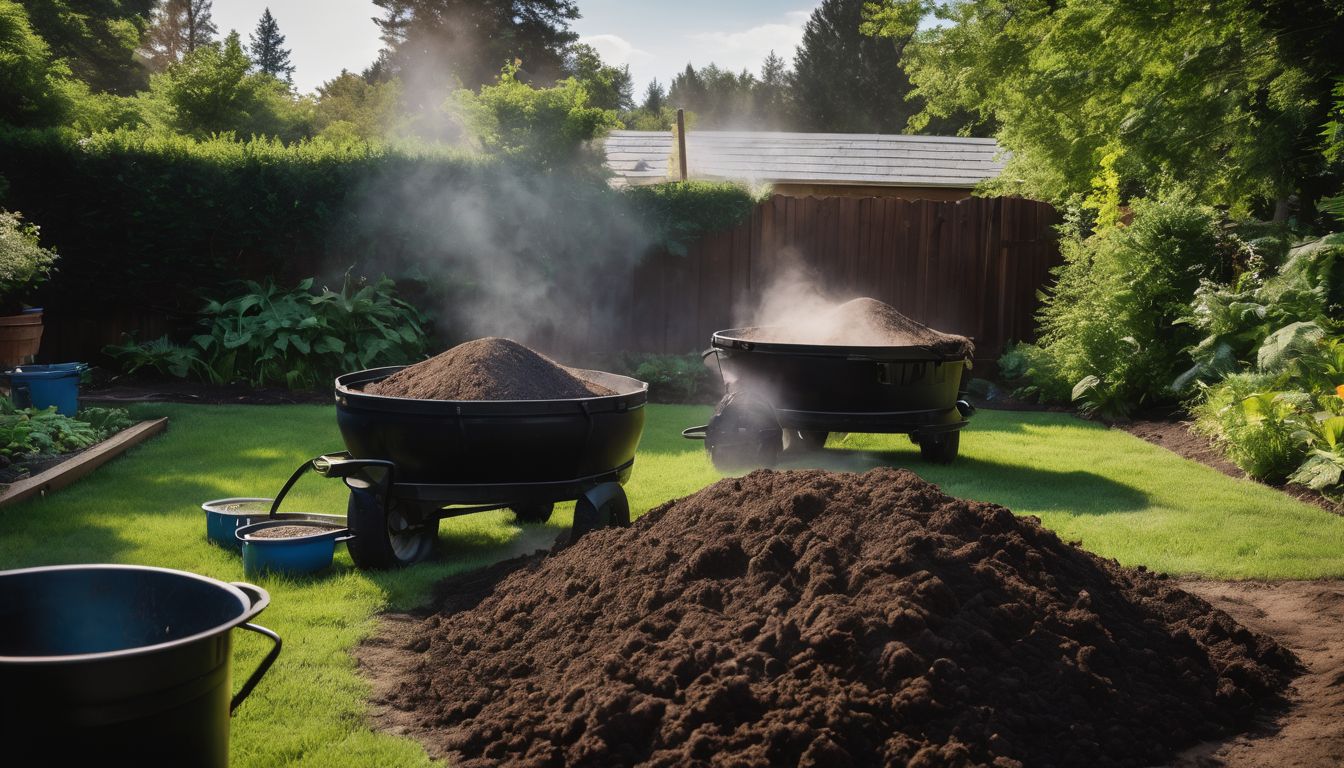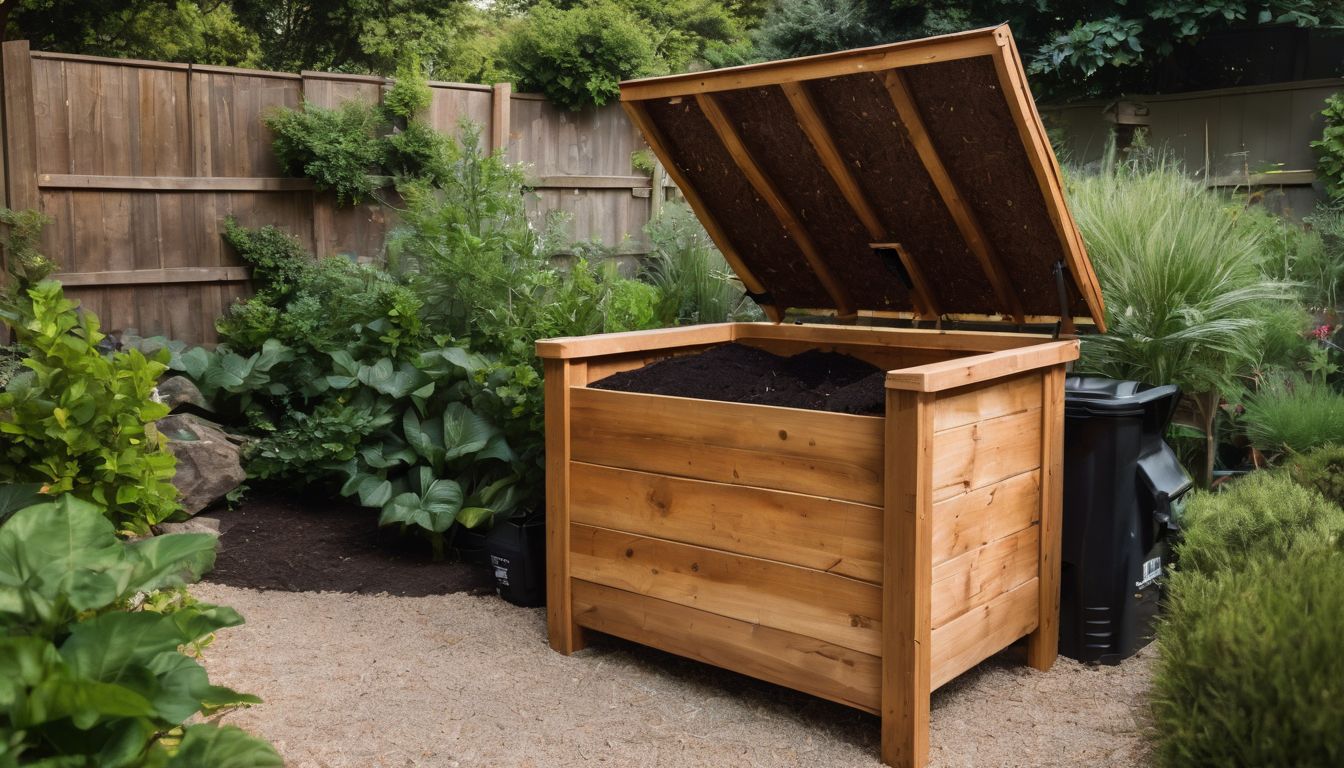Feeling overwhelmed by your bin bags brimming with waste? Every year, the average UK household tosses away over a tonne of rubbish; much of it could be composted. This article unveils how composting at home can trim down your waste and rejuvenate our earth.
Dive in for greener habits!
Key Takeaways
- Composting transforms kitchen scraps and garden waste into valuable, nutrient – rich soil, which can greatly enhance plant growth while reducing reliance on chemical fertilisers.
- By adopting composting practices at home, individuals contribute to the reduction of methane emissions from landfills, addressing a key factor in climate change mitigation.
- Utilising finished compost for gardening helps preserve moisture levels in the soil and supports water conservation efforts.
- Community composting initiatives strengthen local bonds and amplify waste reduction efforts by managing organic refuse collectively within neighbourhoods or groups.
- Simple changes in household routines such as meal planning, proper food storage, and making creative use of leftovers are effective strategies to minimise food wastage.
The Impacts of Household Waste on the Environment
Household waste has detrimental effects on the environment, including pollution from landfills, greenhouse gas emissions, and soil erosion. These impacts contribute to climate change and damage natural ecosystems.
Pollution
Every day, our homes generate waste that contributes to air, water, and land pollution. Whether it’s food scraps that end up rotting in landfills or plastic packaging that never breaks down, the problem of household rubbish harms the environment in many ways.
These pollutants can seep into groundwater or release methane—a potent greenhouse gas—into the atmosphere as they decompose.
Taking steps to recycle more effectively reduces this impact significantly. Composting organic materials like yard trimmings and kitchen leftovers turns what would be pollution into valuable compost for gardening.
By tackling waste at its source, we not only prevent soil erosion but also cut back on harmful emissions contributing to climate change. The practice promotes green living by transforming potential pollutants into sustainable resources for soil enrichment and environmental conservation.
Greenhouse gas emissions
Household waste contributes to greenhouse gas emissions, which have a significant impact on climate change. Organic waste in landfills creates methane, a potent greenhouse gas that traps heat in the atmosphere.
Composting organic waste at home reduces these emissions and helps mitigate climate change by diverting biodegradable materials from landfills. By embracing composting, environmentally conscious individuals can actively contribute to reducing their household’s carbon footprint and supporting sustainable living practices.
Soil erosion
Soil erosion affects the quality and health of our land. It can lead to loss of fertile topsoil, making it challenging for plants to thrive. Composting helps in preventing soil erosion by improving soil structure and promoting water retention, thus reducing the likelihood of erosion.
Compost also enhances the presence of beneficial microorganisms that bind soil particles together, further safeguarding against erosion. By incorporating compost into gardening and landscaping practices, individuals contribute to maintaining healthy soil, ultimately protecting against the detrimental effects of erosion.
Composting is a simple yet effective way to mitigate the impact of soil erosion at a household level. By diverting organic waste from landfills and instead converting it into nutrient-rich compost, individuals actively contribute to preserving the integrity of their local environment while fostering sustainable waste management practices.
What is Composting and How Does it Benefit the Environment?
Composting is the natural process of recycling organic waste into a nutrient-rich soil amendment. It helps reduce greenhouse gas emissions, prevent soil erosion, and enrich the soil for healthier plants and climate resilience.
Definition of composting
Composting is the natural process of recycling organic matter, like food scraps and garden waste, into a nutrient-rich soil amendment called compost. This process is carried out by microorganisms such as bacteria, fungi, and insects, breaking down the materials into humus – a dark brown material that improves soil structure.
Composting plays a crucial role in reducing greenhouse gas emissions and diverting organic waste from landfill sites. Moreover, it creates healthier soils for gardens and landscapes while reducing reliance on chemical fertilisers.
With composting, organic materials are used to create a valuable resource rather than contributing to environmental degradation through disposal in landfill sites or incineration. This simple practice not only benefits individual households but also has wider positive impacts on our environment and climate resilience.
Benefits of compost use
Composting offers numerous benefits for the environment and can make a significant impact on reducing household waste. It helps in organic waste management, promotes food waste recycling, and contributes to greenhouse gas reduction. Additionally, composting aids in preventing soil erosion, which is crucial for household recycling efforts and environmental impact reduction. The process also supports garden waste composting and climate change mitigation through the use of compost bins. Furthermore, it enriches the soil with essential nutrients, promoting sustainable agriculture and fostering climate resilience.
Compost for stormwater management
Composting plays a crucial role in stormwater management by improving soil structure, which reduces surface water runoff and erosion. When applied to gardens and green spaces, compost absorbs and retains water, preventing pollutants from entering natural water sources.
This beneficial process helps alleviate the strain on urban drainage systems during heavy rainfall events, serving as a sustainable solution for managing stormwater.
Incorporating compost into landscaping not only aids in reducing waste but also contributes to creating healthier environments that are more resilient to extreme weather conditions.
Soil enrichment and climate resilience
Composting enriches the soil by providing essential nutrients for plant growth. It increases the soil’s ability to retain water, which contributes to improved climate resilience. Compost also enhances soil structure, promoting better root development and reducing erosion in environmentally conscious ways.
By improving soil health through composting, we actively support conservation efforts and contribute positively to environmental sustainability. This easy and effective method offers a practical solution towards protecting our planet while reducing household waste.
Types of Home Composting
Home composting can take various forms, including backyard composting, worm composting (vermicomposting), and community composting. Each method offers unique benefits for reducing household waste and promoting environmental conservation.
Backyard composting
Backyard composting is a simple and effective way to reduce household waste. It involves creating a compost pile in your own garden using everyday organic materials such as fruit and vegetable scraps, coffee grounds, and yard waste.
By actively managing the decomposition process, you can produce nutrient-rich compost that will benefit your plants and reduce the amount of waste sent to landfills.
To start backyard composting, find a suitable location in your garden for a compost bin or heap. Layer green materials like kitchen scraps with brown materials such as leaves or straw to create an optimal carbon-nitrogen balance for decomposition.
Worm composting (vermicomposting)
Worm composting, also known as vermicomposting, involves using worms to break down organic waste material into nutrient-rich compost. This method is particularly suitable for those living in urban areas or with limited outdoor space.
The process of vermicomposting can significantly reduce the amount of food waste that ends up in landfills. It’s an efficient and effective way to convert kitchen scraps and other organic materials into a valuable resource for enriching soil and promoting sustainable gardening practices.
In vermicomposting, red worms are employed to consume kitchen scraps such as fruit and vegetable peelings, coffee grounds, and paper products. These worms produce nutrient-rich castings which can be used as a natural fertiliser for plants.
Community composting
Transitioning from worm composting to community composting, another effective method for reducing household waste is through community composting. This approach involves shared efforts within a neighbourhood or community to collectively manage organic waste.
By setting up communal compost bins, residents can reduce the amount of food scraps and yard waste that end up in landfills. This not only minimises the production of harmful greenhouse gases but also produces nutrient-rich soil amendments for use in local gardens and green spaces.
Community composting fosters a sense of environmental responsibility, encourages collaboration, and strengthens community bonds around sustainable practices.
How to Compost at Home
To start composting at home, choose the right ingredients such as fruit and vegetable scraps, yard waste, and coffee grounds. Properly maintain the compost by aerating it, maintaining moisture levels, and choosing an appropriate location for your compost pile or bin.
Choosing the right ingredients
To ensure successful composting, it’s important to choose the right ingredients that will break down effectively. Here are the key elements to consider:
- Brown materials: Such as dried leaves, straw, and paper provide carbon.
- Green materials: Like fruit scraps, vegetable peels, grass clippings, and coffee grounds supply nitrogen.
- Water: Moisture is essential for the decomposition process, so add water as needed to keep the pile damp.
- Air: Oxygen is vital for the microorganisms breaking down the compost, so ensure proper aeration by turning or mixing the pile regularly.
- Avoid meat, dairy products, oily food waste, and pet waste which can attract pests and slow down the decomposition process.
Proper maintenance (aeration, moisture, location)
Proper maintenance of your compost pile is crucial for successful composting:
- Regularly turn or mix the compost pile to aerate it.
- Monitor the moisture level by ensuring that the compost pile is damp, but not waterlogged.
- Choose a suitable location for your compost pile, preferably a shaded area with good drainage.
Different methods (compost bin, trench composting, vermicomposting)
Composting at home can be achieved through various methods, each with its own distinct advantages. Here are the different methods for composting:
- Compost Bin: A simple and popular method involving a dedicated container for organic waste, allowing for easy management and control of the composting process.
- Trench Composting: This method involves digging a trench in the garden or flower bed to bury kitchen scraps directly into the soil, providing natural nourishment to plants whilst reducing waste.
- Vermicomposting: Utilising worms to decompose organic materials, vermicomposting is an efficient and space-saving method suitable for indoor or outdoor use, producing nutrient-rich castings that enhance soil fertility.
What to avoid composting
When composting at home, it is important to avoid certain items that can disrupt the composting process and introduce harmful substances. Here are some items you should avoid adding to your compost pile:
- Diseased plants: These can introduce pathogens into the compost, which can survive the process and infect other plants when the compost is used.
- Meat and dairy products: These items can attract pests and create odors, leading to an imbalance in the composting process.
- Oily or greasy foods: These can slow down decomposition and cause unpleasant smells.
- Pet waste: Waste from cats, dogs, or other carnivorous animals may contain harmful pathogens that could contaminate the compost.
- Coal or charcoal ash: These materials can contain substances harmful to plants and should not be used in a home compost pile.
Using Compost and Reducing Food Waste
Using finished compost can improve soil health and plant growth, while reducing the amount of food waste in landfills. Learn about the benefits of using compost and get tips for reducing food waste at home.
Benefits of using finished compost
Using finished compost in your garden provides numerous benefits for the environment. It enriches the soil, promotes healthy plant growth, and reduces the need for chemical fertilisers.
Finished compost also helps retain moisture in the soil, thereby decreasing water usage and conserving this precious resource.
Moreover, using finished compost at home reduces the amount of organic waste sent to landfill, which in turn minimises harmful greenhouse gas emissions. By incorporating compost into your gardening routine, you contribute to a more sustainable and resilient ecosystem while nurturing your plants naturally.
The problem of food waste
Food waste is a significant issue, contributing to environmental problems such as pollution and greenhouse gas emissions. When organic waste ends up in landfills, it decomposes and releases methane, a potent greenhouse gas.
Additionally, food waste contributes to soil erosion when disposed of improperly. By reducing food waste through composting, individuals can play an active role in mitigating these environmental impacts and promoting sustainability.
To address the problem of food waste at home, environmentally conscious individuals can implement strategies like meal planning, proper storage of perishable items, and utilising leftovers creatively.
Furthermore, raising awareness about the impact of food wastage on the environment is crucial for fostering sustainable habits within communities.
Tips for reducing food waste at home
To reduce food waste at home, consider these tips:
- Store fruits and vegetables properly to maximise their shelf life. This can include keeping some items in the fridge and others at room temperature.
- Plan your meals and create a shopping list before going to the grocery store. This can help you buy only what you need and avoid purchasing unnecessary items.
- Use leftovers creatively by incorporating them into new meals rather than letting them go to waste.
- Learn how to properly freeze food for later use, such as soups, stews, or leftover portions.
- Compost food scraps that cannot be used, reducing overall household waste while also creating natural fertiliser for gardens or plants.
- Using Compost and Reducing Food Waste
Conclusion
In conclusion, composting at home is an effective way to reduce household waste. It helps decrease the amount of organic waste that ends up in landfills, mitigating the environmental impacts of pollution and greenhouse gas emissions.
By turning food scraps and yard waste into nutrient-rich compost, individuals can play a vital role in promoting soil health and reducing their carbon footprint. Embracing composting not only benefits the environment but also contributes to creating sustainable, climate-resilient communities.
FAQs
1. What can I put in my compost bin?
You can put fruit and vegetable scraps, eggshells, coffee grounds, leaves, and grass cuttings in your compost bin.
2. Can I compost meat and dairy products?
No, you should not compost meat and dairy products as they can attract pests and cause bad odours.
3. How long does it take for waste to turn into compost?
It usually takes between three to six months for waste to turn into usable compost.
4. Does composting smell bad?
Composting shouldn’t smell bad if you maintain the right balance of green and brown materials and provide good air circulation.
5. Do I need a large garden to start composting?
No, you don’t need a large garden; small bins or wormeries work well for limited spaces or indoors.





